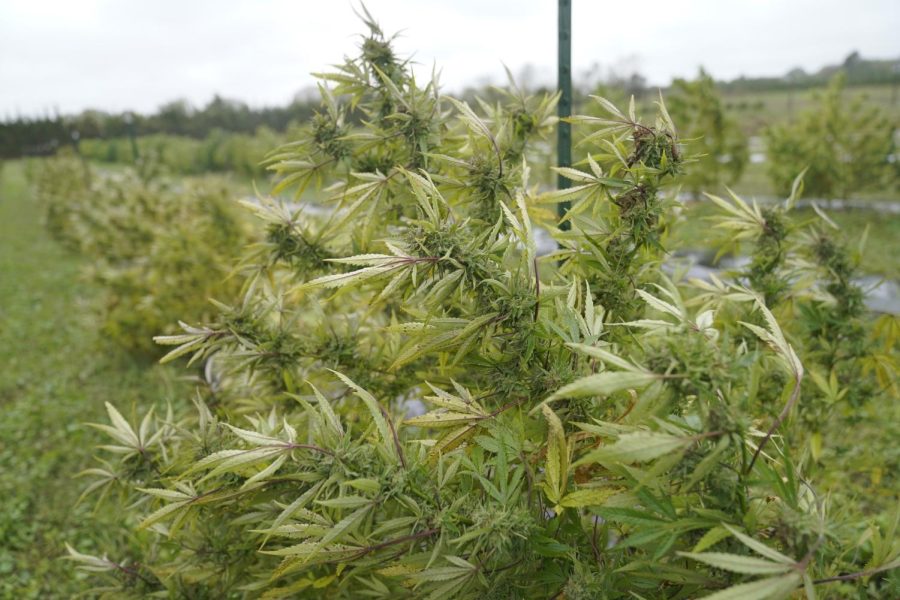Biden de-schedules marijuana and pardons thousands
Marijuana plants for the adult recreational market that are ready for harvesting are seen in the field at a farm in Suffolk County, N.Y.
Oct 14, 2022
On Oct. 6, the White House announced that President Joe Biden would be issuing a pardon to thousands of Americans who have been convicted federally for simple possession of marijuana. In addition, Biden also announced that he would be consulting the Department of Health and Human Services to de-schedule marijuana from its current position, which would affect the severity of the criminal penalty.
Currently, marijuana, along with other narcotics like heroin and LSD, is considered a Schedule 1 drug, which is stated to offer no medical benefit and carries the harshest penalties. Marijuana advocates have long pushed for federal de-scheduling, citing marijuana’s medicinal purposes and relative mildness compared to other Schedule 1 drugs.
Additionally, Biden’s pardon of simple possession offenders was a campaign promise he made during the 2020 election. This is in stark contrast to the large sum of his political career, where Biden positioned himself as an anti-drug crusader and was a staunch advocate of the War on Drugs.
“No one should be in jail just for using or possessing marijuana,” said Biden shortly after the news broke. “It’s already legal in many states and criminal records for marijuana possession have led to needless barriers to employment, to housing and [to] educational opportunities.”
Biden also acknowledged the racial disparity inherent in many state and federal marijuana laws and claimed that these measures would help begin to address it. Additionally, Biden also called for state governors to also issue pardons for state-level possession offenses.
However, these pardons do come with several caveats. They are one-time only, meaning that any future cases of simple possession are not eligible (though, because of de-scheduling, future penalties will be less harsh). Additionally, the pardons are only for those charged federally and do not apply to those charged with breaking state laws (hence the call to action for governors). Lastly, the pardons are only applicable to US citizens.
The news of Biden’s actions sent shockwaves throughout the political landscape. A YouGov poll found that 61% of Americans approve of the decision, which almost aligns with the percentage of Americans who favor complete legalization.
Many Democrats lauded the move. John Fetterman, Lieutenant Governor of Pennsylvania, U.S. Senate nominee and long-time marijuana advocate, showered the president’s actions in praise.
“I spoke with [President Biden] last month about decriminalizing marijuana. Because no one should be turned down for a job or housing or volunteering at their kid’s school because of some old nonviolent weed charge. This is a ‘BFD‘’ and a massive step towards justice.”
The pardons received backlash from some on the right. For instance, Arkansas Gov. Asa Hutchinson, a former federal prosecutor who condemned the president’s decision shortly after it was announced, stated, “[Biden] has adopted all the talking points of the drug legalizers…In terms of de-scheduling marijuana, the president is ignoring the science that is behind the different categories of drugs.” He then accused Biden of playing politics in order to increase the Democrat’s chance of success in the upcoming midterm elections.
However, there were also many on the right who applauded the decision by the president. South Carolina Rep. Nancy Mace, Florida Rep. Matt Gaetz and even Ohio Rep. Dave Joyce (a co-chair of the Congressional Cannabis Caucus) tweeted out their approval of Biden’s actions.
However, Biden also received some criticism from some on the left, who feel as if Biden’s policies didn’t go far enough. One such point of contention was the White House’s admittance that only about 6500 Americans would benefit from the pardons.
Lee Carter, a former state delegate from Virginia, stated on social media, “Biden’s pardon announcement is better than not doing it, but it’s not as good as it could be, it’s not as good as it should be, and it’s definitely not as good as the media coverage makes it sound.”
At John Carroll, ideologically speaking, there was much to praise and criticize about Biden’s order. The Freedom Society of JCU, a libertarian-aligned student organization (which has no official association with the Libertarian Party), gave a statement to The Carroll News concerning their feelings towards the pardons.
“While Biden’s executive order on marijuana represents a positive change in the federal government’s approach to drugs, it is also indicative of the broken legislative system in America…The Freedom Society will always support individuals being pardoned for nonviolent drug crimes. We also believe that many of the laws that criminalized these individuals should not exist in the first place. The negative effects of the war on drugs will be felt substantially until the legislative bodies of America decide to take action.
“It is important to clarify…that no substantial change is occurring from the executive order, that does not mean [we] want to see the office of the President create substantial legislative change. As decentralization is a core tenet of the libertarian philosophy, we believe that Congress and other legislative bodies are best suited to enact new laws, not a single person acting on their own. In this capacity, Congress is failing the American public through their lack of legislation.”
Elizabeth Stiles, professor of Political Science and faculty advisor to the Pre-Law Society, spoke concerning the reach of the pardons and whether these actions by the Biden administration have put the country on the path to full marijuana legalization.”
“The reach is the reach…[Biden] did encourage states to [issue pardons]. Traditionally, states have had the responsibility for law enforcement within their borders and prosecute the vast majority of criminal cases.
“In terms of legalization, it’s strange for states to have something be legal and the federal government to have classified it as a Schedule 1 drug but then the executive asks their own federal forces and prosecutors not to enforce it. Congress has to act to remove it from being a Schedule 1 drug but no President since [George W.] Bush and his Attorney General John Ashcroft has been interested in enforcing it.”
“If the [marijuana] industry, which is growing in wealth, wants to make a concerted push, perhaps they could get [financial regulations on marijuana] changed or get federal decriminalization.”
It is currently unknown what future actions Biden will take concerning marijuana policy, or in what way it will shape the midterms next month. Biden has thus far resisted calls for legalization but these calls have grown stronger in the week since the announcement.













